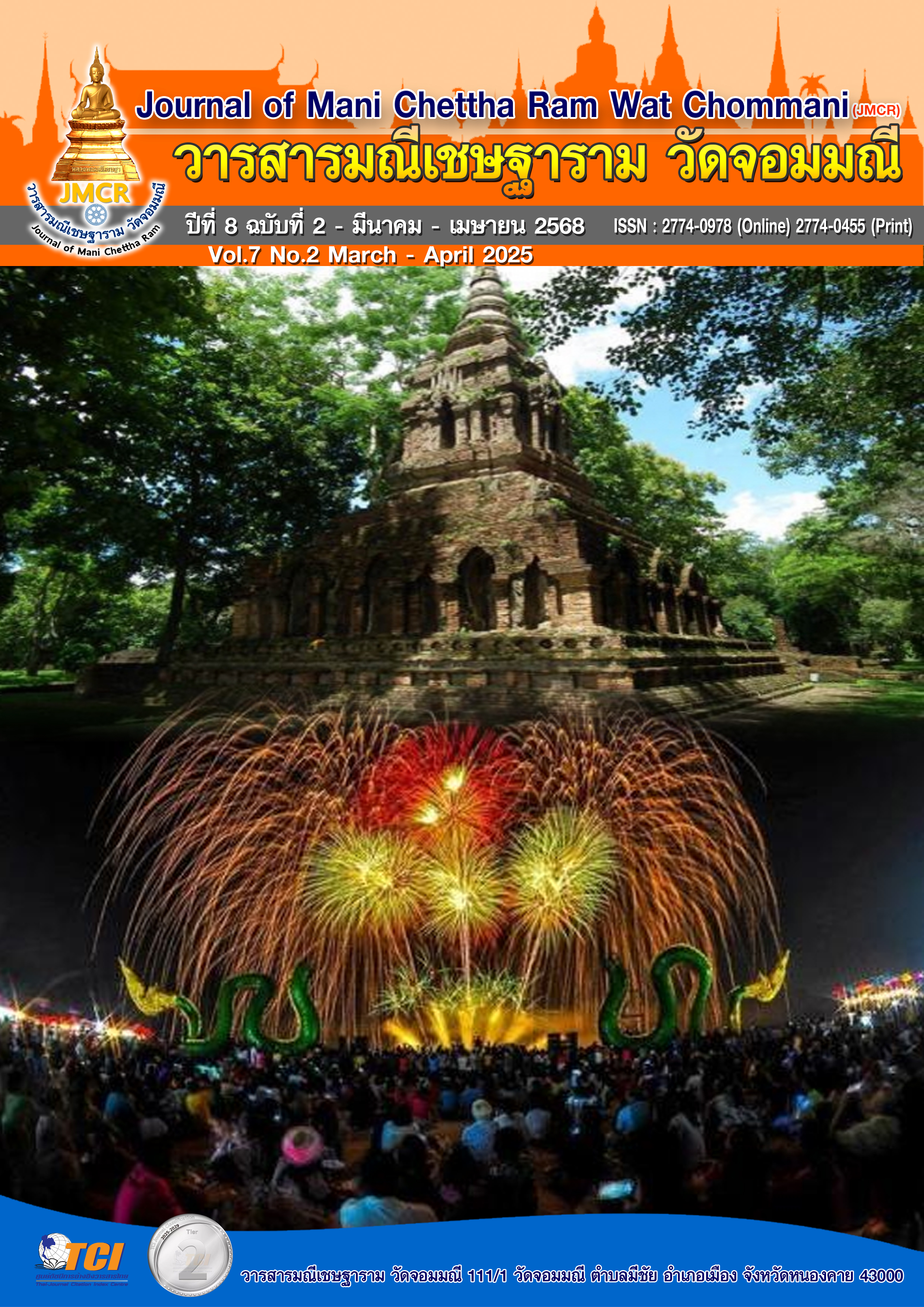ENHANCING THAI ALPHABET RECOGNITION ABILITY THROUGH EDTECH TEACHING MODULES FOR EARLY YEARS 4
Keywords:
EdTech teaching modules, Thai alphabet recognition ability, Early Years 4 studentsAbstract
This study aims to 1) evaluate the effectiveness of the EdTech teaching modules, (2) examine the development of Thai alphabet recognition skills through learning experiences utilizing the EdTech teaching modules, (3) compare the ability to recognize Thai alphabet before and after implementing the EdTech teaching modules, and (4) compare post-intervention Thai alphabet recognition ability against a benchmark of 70%. The sample consisted of 14 Early Years 4 students enrolled in the 2024 academic year at an international school in Bang Phli District, Samut Prakan Province. The study employed a lesson plan integrating EdTech teaching modules and a Thai alphabet recognition assessment. Data analysis utilized statistical methods, including percentage, mean, standard deviation, and non-parametric statistics.
The results revealed that: 1) the effectiveness of the EdTech teaching modules were measured at E1/E2 = 76.13/76.30; 2) the development of Thai alphabet recognition ability through the EdTech teaching modules showed a significant improvement, with an increase in the mean score and a decrease in the standard deviation; 3) the comparison of Thai alphabet recognition ability before and after the EdTech teaching module intervention indicated a statistically significant difference at the .05 level; and 4) a comparison of post-intervention scores against the 70% benchmark showed that 12 out of 14 students (85.71%) met or exceeded the benchmark, while 2 students (14.29%) did not reach the passing criterion.
References
กระทรวงศึกษาธิการ. (2553). พระราชบัญญัติการศึกษาแห่งชาติ พ.ศ. 2542 และที่แก้ไข เพิ่มเติม (ฉบับที่ 2) พ.ศ. 2545 และ (ฉบับที่ 3) พ.ศ. 2553. กรุงเทพมหานคร: โรงพิมพ์องค์การรับส่งสินค้าและพัสดุภัณฑ์.
กุลวรา ชูพงศ์ไพโรจน์. (2562). นิทานผสานอักษร: นวัตกรรมเพื่อความพร้อมทางการศึกษาของเด็กวัยเริ่มเรียน. เรียกใช้เมื่อวันที่ 12 กรกฎาคม 2567. จาก https:/youtu.be/oXMBpram
พจ ธรรมพีร. (2565, 5 พฤษภาคม). ความทรงจำคืออะไร. กรุงเทพมหานคร: คณะจิตวิทยาจุฬาลงกรณ์มหาวิทยาลัย.
วรรณา วัฒนา. (2561). ผลของการใช้เกมการศึกษาต่อการเรียนรู้คำศัพท์ภาษาไทยในนักเรียนประถมศึกษา. วารสารการศึกษาปฐมวัย. 8(2). 112-129.
วรรณพร สุขสวัสดิ์. (2564). การใช้สื่อดิจิทัลในการส่งเสริมการเรียนรู้เชิงสร้างสรรค์. วารสารเทคโนโลยีและการศึกษา. 15(2). 25-40.
วิรัช วงศ์ภินันท์วัฒนา. (2564). ภาษากับการสื่อสารมวลชน. ขอนแก่น: คณะมนุษยศาสตร์และสังคมศาสตร์ มหาวิทยาลัยขอนแก่น.
ศุภัชญา ศุภเมธากร. (2564). การพัฒนาความสามารถในการจำและความคงทนในการจำพยัญชนะไทยโดยการจัดกิจกรรมการเรียนรู้ด้วยจินตภาพกับการเล่าเรื่องสำหรับนักเรียนระดับปฐมวัย. ใน วิทยานิพนธ์ศึกษาศาสตร์มหาบัณฑิต: มหาวิทยาลัยธุรกิจบัณฑิตย์.
อุษณีย์ บัวสมบัติ. (2563). การใช้แท็บเล็ตในการเรียนการสอนปฐมวัย. วารสารการศึกษาปฐมวัย. 12(1): 45-60.
Bruner, J. S. (1966). Toward a theory of instruction. (1st ed.). Massachusetts: Harvard University Press.
Brown, A. & Wilson, J. (2023). Educational innovation through technology. International Journal of Educational Research. 116: 102089.
Januszewski, A. & Molenda, M. (Eds.). (2008). Educational Technology: A Definition with Commentary. New York: Routledge.
Khalid et al., (2024). Significance Of Mother Tongue On Second Language Acquisition: The Case Of English Learning. International. Journal of Contemporary Issues in Social Sciences. 3(2): 54-59.
Smith, J. & Roberts, K. (2023). Digital technologies and educational change. Educational Technology Research and Development. 71(2): 235-256.
Waree, C. (2018). Application Development on Tablet to Promote a Classroom Research Skills for SSRU’ Students. In: Chang, M., et al. Challenges and Solutions in Smart Learning. Lecture Notes in Educational Technology. Springer, Singapore. https://doi.org/10.1007/978-981-10-8743-1_4




